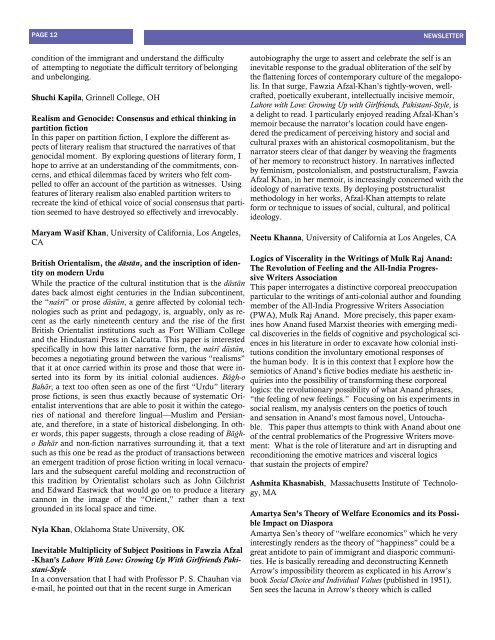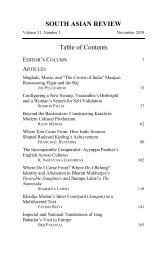2010 Winter Newsletter - South Asian Literary Association
2010 Winter Newsletter - South Asian Literary Association
2010 Winter Newsletter - South Asian Literary Association
Create successful ePaper yourself
Turn your PDF publications into a flip-book with our unique Google optimized e-Paper software.
PAGE 12 NEWSLETTER<br />
condition of the immigrant and understand the difficulty<br />
of attempting to negotiate the difficult territory of belonging<br />
and unbelonging.<br />
Shuchi Kapila, Grinnell College, OH<br />
Realism and Genocide: Consensus and ethical thinking in<br />
partition fiction<br />
In this paper on partition fiction, I explore the different aspects<br />
of literary realism that structured the narratives of that<br />
genocidal moment. By exploring questions of literary form, I<br />
hope to arrive at an understanding of the commitments, concerns,<br />
and ethical dilemmas faced by writers who felt compelled<br />
to offer an account of the partition as witnesses. Using<br />
features of literary realism also enabled partition writers to<br />
recreate the kind of ethical voice of social consensus that partition<br />
seemed to have destroyed so effectively and irrevocably.<br />
Maryam Wasif Khan, University of California, Los Angeles,<br />
CA<br />
British Orientalism, the dāstān, and the inscription of identity<br />
on modern Urdu<br />
While the practice of the cultural institution that is the dāstān<br />
dates back almost eight centuries in the Indian subcontinent,<br />
the “našrī” or prose dāstān, a genre affected by colonial technologies<br />
such as print and pedagogy, is, arguably, only as recent<br />
as the early nineteenth century and the rise of the first<br />
British Orientalist institutions such as Fort William College<br />
and the Hindustani Press in Calcutta. This paper is interested<br />
specifically in how this latter narrative form, the našrī dāstān,<br />
becomes a negotiating ground between the various “realisms”<br />
that it at once carried within its prose and those that were inserted<br />
into its form by its initial colonial audiences. Bāġh-o<br />
Bahār, a text too often seen as one of the first “Urdu” literary<br />
prose fictions, is seen thus exactly because of systematic Orientalist<br />
interventions that are able to posit it within the categories<br />
of national and therefore lingual—Muslim and Persianate,<br />
and therefore, in a state of historical disbelonging. In other<br />
words, this paper suggests, through a close reading of Bāġho<br />
Bahār and non-fiction narratives surrounding it, that a text<br />
such as this one be read as the product of transactions between<br />
an emergent tradition of prose fiction writing in local vernaculars<br />
and the subsequent careful molding and reconstruction of<br />
this tradition by Orientalist scholars such as John Gilchrist<br />
and Edward Eastwick that would go on to produce a literary<br />
cannon in the image of the “Orient,” rather than a text<br />
grounded in its local space and time.<br />
Nyla Khan, Oklahoma State University, OK<br />
Inevitable Multiplicity of Subject Positions in Fawzia Afzal<br />
-Khan's Lahore With Love: Growing Up With Girlfriends Pakistani-Style<br />
In a conversation that I had with Professor P. S. Chauhan via<br />
e-mail, he pointed out that in the recent surge in American<br />
autobiography the urge to assert and celebrate the self is an<br />
inevitable response to the gradual obliteration of the self by<br />
the flattening forces of contemporary culture of the megalopolis.<br />
In that surge, Fawzia Afzal-Khan’s tightly-woven, wellcrafted,<br />
poetically exuberant, intellectually incisive memoir,<br />
Lahore with Love: Growing Up with Girlfriends, Pakistani-Style, is<br />
a delight to read. I particularly enjoyed reading Afzal-Khan’s<br />
memoir because the narrator’s location could have engendered<br />
the predicament of perceiving history and social and<br />
cultural praxes with an ahistorical cosmopolitanism, but the<br />
narrator steers clear of that danger by weaving the fragments<br />
of her memory to reconstruct history. In narratives inflected<br />
by feminism, postcolonialism, and poststructuralism, Fawzia<br />
Afzal Khan, in her memoir, is increasingly concerned with the<br />
ideology of narrative texts. By deploying poststructuralist<br />
methodology in her works, Afzal-Khan attempts to relate<br />
form or technique to issues of social, cultural, and political<br />
ideology.<br />
Neetu Khanna, University of California at Los Angeles, CA<br />
Logics of Viscerality in the Writings of Mulk Raj Anand:<br />
The Revolution of Feeling and the All-India Progressive<br />
Writers <strong>Association</strong><br />
This paper interrogates a distinctive corporeal preoccupation<br />
particular to the writings of anti-colonial author and founding<br />
member of the All-India Progressive Writers <strong>Association</strong><br />
(PWA), Mulk Raj Anand. More precisely, this paper examines<br />
how Anand fused Marxist theories with emerging medical<br />
discoveries in the fields of cognitive and psychological sciences<br />
in his literature in order to excavate how colonial institutions<br />
condition the involuntary emotional responses of<br />
the human body. It is in this context that I explore how the<br />
semiotics of Anand’s fictive bodies mediate his aesthetic inquiries<br />
into the possibility of transforming these corporeal<br />
logics: the revolutionary possibility of what Anand phrases,<br />
“the feeling of new feelings.” Focusing on his experiments in<br />
social realism, my analysis centers on the poetics of touch<br />
and sensation in Anand’s most famous novel, Untouchable.<br />
This paper thus attempts to think with Anand about one<br />
of the central problematics of the Progressive Writers movement:<br />
What is the role of literature and art in disrupting and<br />
reconditioning the emotive matrices and visceral logics<br />
that sustain the projects of empire?<br />
Ashmita Khasnabish, Massachusetts Institute of Technology,<br />
MA<br />
Amartya Sen’s Theory of Welfare Economics and its Possible<br />
Impact on Diaspora<br />
Amartya Sen’s theory of “welfare economics” which he very<br />
interestingly renders as the theory of “happiness” could be a<br />
great antidote to pain of immigrant and diasporic communities.<br />
He is basically rereading and deconstructing Kenneth<br />
Arrow’s impossibility theorem as explicated in his Arrow’s<br />
book Social Choice and Individual Values (published in 1951).<br />
Sen sees the lacuna in Arrow’s theory which is called



